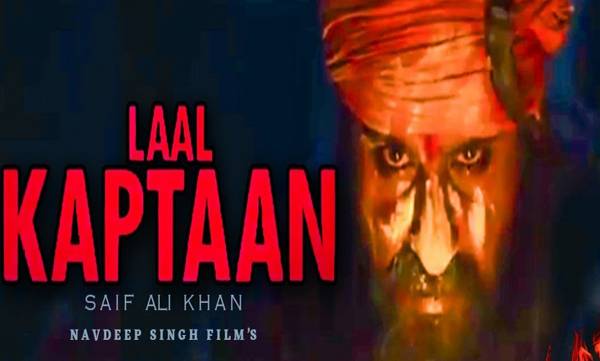Eros International and Colour Yellow Productions Pvt. Ltd.’s Laal Kaptaan (A) is a fictional period drama set in the 18th century.
Gossain (Saif Ali Khan) is a naga baba who is on a revenge mission against Rehmat Khan (Manav Vij).
Rehmat Khan has escaped with gold and other riches. He is with his team of warriors. Rehmat Khan’s wife (Simone Singh) and newborn child are also escaping with him. A fortune teller, Laal Pari (Vibha Rani) had predicted some terrible things for Rehmat Khan and hence his wife is quite concerned about that. The time period is somewhere in the 18th century. The Marathas, Mughals, Awadhis and Afghans are at war with the Britishers who have come to India. But Rehmat Khan seems to be a black sheep.
Gossain is on Rehmat Khan’s trail and wants to catch him before he crosses the Jamuna river. On the way, he meets a widow (Zoya Hussain) who looks after him when he is seriously injured. The widow pleads with him to take her along with him. Quite reluctantly, Gossain obliges.
Gossain comes face-to-face with Rehmat Khan but before he knows it, Rehmat Khan captures him and tortures him, repeatedly asking him why he had come tracking him and who had sent him. Anyhow, after many days of torture, Gossain manages to free himself from Rehmat Khan’s clutches but before he can seek his revenge, the latter escapes. A tracker (Deepak Dobriyal) agrees to help Gossain reach Rehmat Khan before he crosses river Jamuna.
Does Gossain eliminate Rehmat Khan? Or does Rehmat Khan kill Gossain? Why was Gossain keen on seeking revenge on Rehmat Khan?
Deepak Venkatesha and Navdeep Singh have written a story which reveals things step by step. This sometimes gets a bit irritating because questions crop up in the minds of the viewers at several places but they get the answers to their questions only in the end. This also makes the story confusing at times. The duo’s screenplay is long-drawn and slow-paced. A film of this kind, which moves on a single track, should be fast-paced if the audience’s interest is to be sustained. Also, because the place of action all through the drama is the open terrain — mountains, rivers and barren land — monotony sets in in the audience’s mind. The portion in which Gossain is held captive by Rehmat Khan is too long and, therefore, may make the audience feel restless, more so because Gossain is the hero. No doubt, the ending is good but it is not worth the almost two-and-a-half-hour drama that precedes it. Sudip Sharma’s dialogues are alright but the dialect in which the characters speak, makes it difficult to fully comprehend the dialogues. This gets very irritating for the viewers.
Saif Ali Khan looks the character he plays and acts with admirable ease in a role that offers him good scope. His get-up is impressive. Manav Vij is quite god as Rehmat Khan. His voice modulation adds to his performance. Zoya Hussain does a fine job as the widow. Deepak Dobriyal entertains with his ‘How do do’ dialogue. His acting is nice. Simone Singh lends good support as Rehmat Khan’s wife. Aamir Bashir makes his presence felt as Adham. Neeraj Kabi is splendid as Sadullah Khan. Vibha Rani makes an excellent impact as Laal Pari. Her get-up, dialogue delivery and acting are all marvellous. Sonakshi Sinha adds star value in a tiny role. Rudra Soni (as the young lad who is hanged), Abhishek Madrecha (as young Rehmat Khan), Varun (as young Adham), Chetan Hansraj (as Sangram Singh), Ajay Paul (as Thakur), Irshad (as the eunuch), Arun Singh Bhagat (as the old Gossain), Madan Deodhar (as the Maratha captain), Milind Dastane (as the Maratha commander), Raj Kishore (as the naga chief), Vijay Sanap (as the Maratha warrior head), Saurabh Sachdeva (as the Mughal General), Gautam Agarwal (as the old naga), Rudra Agarwal (as the young naga) and the rest are adequate.
Navdeep Singh’s direction is good. He has created the atmosphere beautifully and has extracted good work out of his actors. But his narration is too elitist in appeal. Besides, his story-telling style (of revealing too little) may not find too many takers, especially outside the circle of class viewers. Samira Koppikar’s music does not have disc value but the songs, which are part of the narrative, appeal in the film. Lyrics (Saurabh Jain, Puneet Sharma and Sahib) are weighty. Background music (by Naren Chandavarkar and Benedict Taylor) is impactful. Shanker Raman’s cinematography is excellent and so are the locations. Action scenes, choreographed by Abdul Salam Ansari, are raw and effective. Rakesh Yadav’s production designing is very good. Jabeen Merchant’s editing is sharp.
On the whole, Laal Kaptaan has very limited appeal and will, therefore, not be able to fight the box-office battle. Except for the classes, there won’t be too many takers for the film.
Released on 18-10-’19 at Inox (daily 4 shows) and other cinemas of Bombay by Eros International. Publicity: dull. Opening: poor. …….Also released all over. Opening was below the mark everywhere.





























